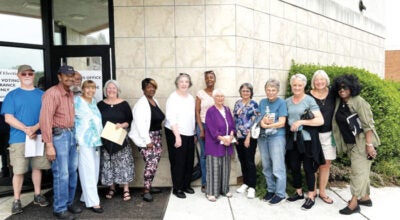Larry Efird: Point of view
Published 1:26 pm Sunday, January 15, 2017
(When teaching about an author’s point of view, I often use things I’ve written myself. The following is an excerpt from a memoir I wrote about being in the second grade in 1962-63.)
My second grade teacher clearly did not cut me any slack when it came to classroom discipline. She apparently decided that she needed to wash my mouth out with soap on one occasion. I don’t remember what I said, but I do remember the taste of industrial, pink school soap on a wet, brown paper towel being rubbed on my tongue for about five seconds. The main thought that kept running through my head was that I should be thankful for soap on my tongue and not a paddle on my backside.
I wasn’t sure if my parents would hear about the mouth-washing episode, but I knew they would have heard about a paddling. If she didn’t tell them, I surely was not going to. I also knew that none of my friends would tattle on me because I actually felt some level of corporate sympathy on my behalf as I stood in front of the class with my tongue out ready to be wiped clean of any verbal filth or disrespectful residue.
The funny part about this whole incident is that I have never forgotten it. When I had been a teacher for more than 25 years, I happened to notice that one of my own students in a freshman English class had the same last name as my second grade teacher. It turned out to be her granddaughter.
When I told the granddaughter that her grandmother had been my teacher, her first response was, She was mean. I was somewhat caught off guard until this young lady informed me that most everyone who had her grandmother invariably would provide the same information about how stern and severe their former teacher had been years before.
Ironically, those threatening attributes had never crossed my mind when I was a tousle-headed urchin in her class. I actually liked her a great deal and still remember that she taught me how to spell the words cousin and island. I was having trouble with those two words, and I finally learned how to spell them before I got out of her class.
The soap memory has remained with me a very long time as well, but it didn’t scar me for life. It just made me be more careful about what I said around grown-ups!
I also remember how we as a class worried about two dogs that were mysteriously stuck together outside while we were waiting in the lunch line. When we told our teacher, she calmly asked the janitor to get a pot of cold water from the cafeteria and throw it on the two dogs. We watched as he threw the water on them, but that didn’t split them apart. None of us knew what could have possibly caused them to get stuck, and we didn’t stop asking questions about it the rest of the day. But we knew that as long as our teacher knew what to do, we didn’t have to worry about the dogs. They would surely be OK at some point. We found security in the philosophy that if children were expected to behave in class, then animals shouldn’t be exempt from a teacher’s reprimand either.
Maybe that’s why I didn’t think there was much wrong in the world in 1963, because the adults I knew always fixed all the problems. I had heard the mysterious and almost frightening words, “communism” and “integration,” but those words were far too big for a second-grader to spell — or to understand.
I had also heard of a newly famous black preacher named Martin Luther King, Jr., who would make a big speech in Washington, D.C., later that summer. Although he was a good man, a lot of people, especially whites, didn’t want to hear what he had to say. I was sure that if they could have, they would have tried to wash his mouth out with soap too. Sadly, that was something I could understand.
Larry Efird teaches at A.L. Brown High School in Kannapolis.


